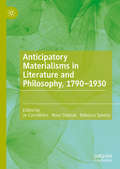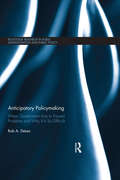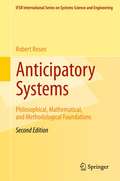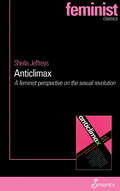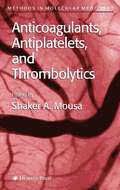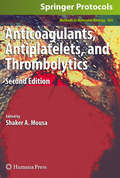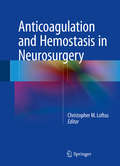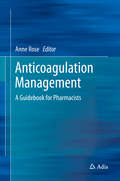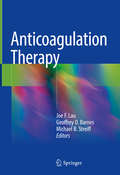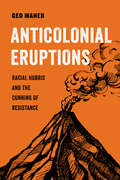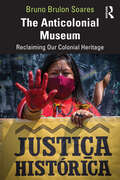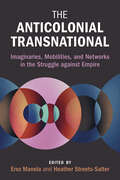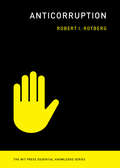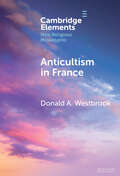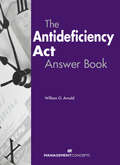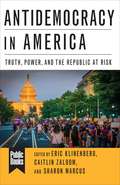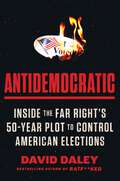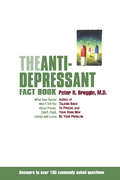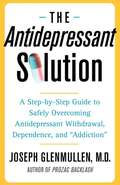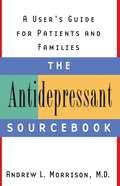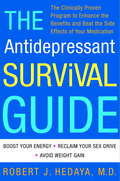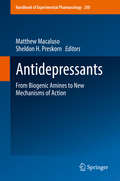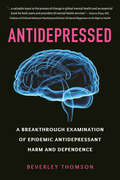- Table View
- List View
Anticipatory Materialisms in Literature and Philosophy, 1790–1930
by Jo Carruthers Nour Dakkak Rebecca SpenceAnticipatory Materialisms explores nineteenth and early twentieth-century literature thatanticipates and pre-empts the recent philosophical ‘turn’ to materiality and affect. Critical volumes that approach literature via the prism of New Materialism are in the ascendence. This collection stakes a different claim: by engaging with neglected theories of materiality in literary and philosophical works that antedate the twenty-first century ‘turn’ to New Materialism and theories of affect, the project aims to establish a dialogue between recent theoretical considerations of people-world relations in literature and that which has gone before. This project seeks to demonstrate the particular and meaningful ways in which interactions between people and the physical world were being considered in literature between the nineteenth and early twentieth centuries. The project does not propose an air of finality; indeed, it is our hope that offering provocative and challenging chapters, which approach the subject from various critical and thematic perspectives, the collection will establish a broader dialogue regarding the ways in philosophy and literature have intersected and informed each other over the course of the long nineteenth century.
Anticipatory Policymaking: When Government Acts to Prevent Problems and Why It Is So Difficult (Routledge Research in Public Administration and Public Policy)
by Rob A. DeLeoPublic policy analysts and political pundits alike tend to describe the policymaking process as a reactive sequence in which government develops solutions for clearly evident and identifiable problems. While this depiction holds true in many cases, it fails to account for instances in which public policy is enacted in anticipation of a potential future problem. Whereas traditional policy concerns manifest themselves through ongoing harms, "anticipatory problems" are projected to occur sometime in the future, and it is the prospect of their potentially catastrophic impact that generates intense speculation and concern in the present. Anticipatory Policymaking: When Government Acts to Prevent Problems and Why It Is So Difficult provides an in depth examination of the complex process through which United States government institutions anticipate emerging threats. Using contemporary debates over the risks associated with nanotechnology, pandemic influenza, and global warming as case study material, Rob A. DeLeo highlights the distinctive features of proactive governance. By challenging the pervasive assumption of reactive policymaking, DeLeo provides a dynamic approach for conceptualizing the political dimensions of anticipatory policy change.
Anticipatory Systems: Philosophical, Mathematical, and Methodological Foundations (IFSR International Series in Systems Science and Systems Engineering #1)
by Robert RosenRobert Rosen was not only a biologist, he was also a brilliant mathematician whose extraordinary contributions to theoretical biology were tremendous. Founding, with this book, the area of Anticipatory Systems Theory is a remarkable outcome of his work in theoretical biology. This second edition of his book Anticipatory Systems, has been carefully revised and edited, and includes an Introduction by Judith Rosen. It has also been expanded with a set of Prolegomena by Dr. Mihai Nadin, who offers an historical survey of this fast growing field since the original work was published. There is also some exciting new work, in the form of an additional chapter on the Ontology of Anticipation, by Dr. John Kineman. An addendum-- with autobiographical reminiscences by Robert Rosen, himself, and a short story by Judith Rosen about her father-- adds a personal touch. This work, now available again, serves as the guiding foundations for the growing field of Anticipatory Systems and, indeed, any area of science that deals with living organisms in some way, including the study of Life and Mind. It will also be of interest to graduate students and researchers in the field of Systems Science.
Anticlimax: A Feminist Perspective on the Sexual Revolution
by Sheila JeffreysSexuality has been reframed by postmoderism, but this clear discussion of literature, politics, and popular culture provides a useful historical view. The sexual revolution of the 1960s and 1970s is remembered as a time of great freedom for women, but did the sexual revolution have the same goals as the Women's Liberation Movement? Was it truly liberation for women or just another insidious form of oppression? This provocative book argues that sexual freedom sometimes directly opposed actual freedom for women. Tracing sexual mores and attitudes from the 1950s through the 1990s, it explores the nature of both straight and gay relationships and offers original and compelling commentary on The Joy of Sex, Lolita, Naked Lunch, and other representations in the literature on sexuality. Newly updated, this edition provides an important critique and insight into these controversial issues.
Anticoagulant Rodenticides and Wildlife (Emerging Topics in Ecotoxicology #5)
by John E. Elliott Nico W. van den Brink Richard F. Shore Barnett A. RattnerCommensal rodents pose health risks and cause substantial damage to property and food supplies. Rats have also invaded islands and pose a serious threat to native wildlife, particularly raptors and seabirds. Estimates of total damage from introduced rats range into the billions of dollars in developed countries. This book aims to provide a state-of-the-art overview of the scientific advancements in the assessment of exposure, effects and risks that currently used rodenticides may pose to non-target organisms in the environment, along with practical guidance for characterization of hazards. This will be discussed in relation to their efficacy, and the societal needs for rodent control, and discussion of risk mitigation and development of alternatives. The flow in the book is planned as: a. introduction and setting the scene b. problem description (risks and effects on non-targets and secondary poisoning, development of resistance) c. ; alternatives, regulation and risk mitigation d. conclusions and recommendations
Anticoagulants, Antiplatelets, and Thrombolytics: Methods And Protocols (Methods in Molecular Medicine #93)
by Shaker A. Mousa1This collection of review articles highlights the latest development of antithrombotics and provides proven experimental methods for the further development of new and improved anticoagulants. Among the cutting-edge developments reviewed are the novel usage of low molecular weight heparins, such antithrombin agents as the hirudin, and such antiplatelet drugs as the GPIIb/IIIa inhibitors and ADP receptor antagonists. Additional innovations discussed include aspirin and clopidogrel, the expanded use of polytherapeutic approaches, antiproteases (factors IIa, Xa, and VIIa), tissue factor targeting, platelet receptor targeting, and antithrombin III modulation.
Anticoagulants, Antiplatelets, and Thrombolytics, 2nd Edition: Methods And Protocols (Methods in Molecular Biology #663)
by Shaker A. MousaDuring the past decade, remarkable progress has been made in the development of newer drugs to prevent and treat thromboembolic disorders, such as oral direct anti-Xa and anti-IIa antagonists, as well as oral antiplatelet ADP antagonists with rapid onset and offset. In addition, there has been concentrated effort aimed at identifying novel uses of traditional antithrombotic drugs, such as aspirin, heparin, and oral anticoagulants, as well as combinations of agents, such as more than one antiplatelet, antiplatelet with anticoagulant, antiplatelet with or without thrombolytic. Anticoagulants, Antiplatelets, and Thrombolytics, Second Edition provides updates on various strategies in thrombosis, experimental models, and clinical and recent advances in the discovery and development of novel antithrombotics. As a volume in the highly successful Methods in Molecular BiologyTM series, this collection provides the kind of detailed description and implementation advice that is crucial for getting optimal results. Easy to use and up to date, Anticoagulants, Antiplatelets, and Thrombolytics, Second Edition is an ideal guide for researchers aiming for the future of this vital field, focusing on the prevention of thromboembolic disorders and the protection of the vascular endothelium.
Anticoagulation and Hemostasis in Neurosurgery
by Christopher M. LoftusThis book is an up-to-date reference on all aspects of anticoagulation and hemostasis in neurosurgery. After an opening section on basic principles and drug classes in current use, detailed consideration is given to coagulation issues relevant to all patients, not just neurosurgical ones. The coverage includes, for example, deep vein thrombosis, pulmonary embolism, and disseminated intravascular coagulation. A variety of important issues specific to neurosurgical practice are then addressed, and a summary of current guidelines and best practices is provided. By bringing together the latest knowledge from across the discipline, this book will serve as a sound basis for informed decision making in surgical practice. It will be of daily value for neurosurgeons and trainees worldwide and will also be of interest to emergency room physicians, surgeons in general, critical care physicians, neurologists, and hospital medicine specialists.
Anticoagulation Management: A Guidebook for Pharmacists
by Anne RoseIn addition to acting as a training guide for pharmacists, pharmacy residents and pharmacy students who seek to practice in areas associated with patients on anticoagulant therapy, the information presented within highlights the growing role of the pharmacist in these contexts. Readers will find useful information on anticoagulant management across all pharmacy practice areas, including the inpatient, ambulatory, emergency services and transitions of care settings. Particular attention is given to summarizing best practices and providing 'real world' examples of ways in which pharmacists can be involved in anticoagulation management and the impact of such involvement. In the first major section of the book, each chapter focuses on the role of the pharmacist in the management of medication with a specific type of anticoagulants (e. g. warfarin, heparin and target-specific oral agents) in various healthcare settings. A broader overview of the clinical management of anticoagulation therapy is provided in the second major section, including descriptions of the role of pharmacists in assessing venous thromboembolism risk, ensuring patients receive appropriate prophylactic therapy, and monitoring outcomes.
Anticoagulation Therapy
by Joe F. Lau Geoffrey D. Barnes Michael B. StreiffThis book presents the latest evidence and guidelines supporting the use of anticoagulant therapy for various clinical scenarios. The field of anticoagulation therapy is evolving rapidly, particularly since the arrival and widespread adoption of direct oral anticoagulants. Organized in two parts, this book reviews the pharmacologic properties of various anticoagulants and details the clinical applications of anticoagulant therapy. Drugs such as warfarin and unfractionated heparin, as well as parenteral and direct oral anticoagulants are discussed in terms of their pharmacokinetics, drug-disease interactions, dosing strategies, and risk considerations. Clinical applications of anticoagulant therapy in disorders such as acute coronary syndromes, atrial fibrillation, and thrombophilia and in special populations such as pregnant women, the elderly, and in the patient with cancer are highlighted. Clinical vignettes, algorithms, clinical pearls, and self-assessment questions are integrated throughout the book. Featuring contributions from authorities in the field, Anticoagulation Therapy is an essential resource for cardiologists, vascular medicine specialists, hematologists, internists, and all other healthcare professionals who prescribe anticoagulants.
Anticolonial Eruptions: Racial Hubris and the Cunning of Resistance (American Studies Now: Critical Histories of the Present #15)
by Geo MaherThis incisive study reveals the fundamental, paradoxical weakness of colonialism and the enduring power of anticolonial resistance. Resistance is everywhere, but everywhere a surprise, especially when the agents of struggle are the colonized, the enslaved, the wretched of the earth. Anticolonial revolts and slave rebellions have often been described by those in power as "eruptions"—volcanic shocks to a system that does not, cannot, see them coming. In Anticolonial Eruptions, Geo Maher diagnoses a paradoxical weakness built right into the foundations of white supremacist power, a colonial blind spot that grows as domination seems more complete. Anticolonial Eruptions argues that the colonizer’s weakness is rooted in dehumanization. When the oppressed and excluded rise up in explosive rebellion, with the very human demands for life and liberation, the powerful are ill-prepared. This colonial blind spot is, ironically, self-imposed: the more oppressive and expansive the colonial power, the lesser-than-human the colonized are believed to be, the greater the opportunity for resistance. Maher calls this paradox the cunning of decolonization, an unwitting reversal of the balance of power between the oppressor and the oppressed. Where colonial power asserts itself as unshakable, total, and perpetual, a blind spot provides strategic cover for revolutionary possibility; where race or gender make the colonized invisible, they organize, unseen. Anticolonial Eruptions shows that this fundamental weakness of colonialism is not a bug, but a permanent feature of the system, providing grounds for optimism in a contemporary moment roiled by global struggles for liberation.
The Anticolonial Museum: Reclaiming Our Colonial Heritage
by Bruno Brulon SoaresThe Anticolonial Museum acknowledges some of the consequences of colonialism in the current work of museums. Looking at museum theory in a critical way, it proposes a radical revision of museums’ rhetoric on decolonisation, as well as their public image and practices. Bringing together a collection of reflections on decolonisation through the observation of museum performance and discourse, the author considers current practices in response to the social claims of marginalised groups and activists. Drawing from a genealogy of decolonial thinking in museology, Brulon Soares identifies the inherent paradoxes reflected in museum work. The book’s focus is not exclusively on the reality of colonised countries, nor on the context of former imperialist nations—instead, it raises anticolonial questions, finding common ground between the different actors involved in the museum: scholars, students, curators, practitioners, community members and Indigenous creators. One of the central aims of this book is to view the museum as a locus for multiple enunciations, thus identifying in museum practice the active possibility of reconnecting subjectivities and restoring material fluxes to effectively repair the bonds that have been frayed by colonialism and an expanding modernity. The Anticolonial Museum will be of great interest to researchers and students engaged in the study of decolonisation. It will also be essential for practitioners who wish to reconsider the impact of coloniality on their own position and everyday practice.
The Anticolonial Transnational: Imaginaries, Mobilities, and Networks in the Struggle against Empire (Global and International History)
by Erez Manela Heather Streets-SalterThis volume is the first to explore transnational anticolonialism as a general global phenomenon that spanned the entire twentieth century. Its collected essays model both a broadening of the issues under consideration and the collaboration necessary to do justice to the scope of this vibrant field. They showcase new work by scholars who explore the anticolonial transnational in multiple geographical regions, from a variety of perspectives, and at many different times across the long twentieth century. Revealing that anticolonial movements everywhere in this period were invariably transnational in terms of their imaginaries, mobilities, and networks, these essays also demonstrate that centering transnational connections can change our understanding of the anticolonial past. The legacies of transnational anticolonial strategies and networks fundamentally shaped the present. Together, these essays present a fresh, kaleidoscopic view of the geographical, chronological, and thematic possibilities of the global anticolonial transnational.
Anticorruption (The MIT Press Essential Knowledge Series)
by Robert I. RotbergPresident Emeritus of the World Peace Foundation and Fellow of the American Academy of Arts and Sciences, Robert I. Rotberg, showcases how to win the ever-raging anticorruption battle, through this guide for citizens and politicians on either side of the aisle. The phenomenon of corruption has existed since antiquity; from ancient Mesopotamia to our modern-day high-level ethical morass, people have sought a leg up, a shortcut, or an end run to power and influence. In this volume in the MIT Press Essential Knowledge series, Robert Rotberg, a recognized authority on governance and international relations, offers a definitive guide to corruption and anticorruption, charting the evolution of corruption and offering recommendations on how to reduce its power and spread. The most important component of anticorruption efforts, he argues, is leadership that is committed to changing dominant political cultures.
Anticultism in France: Scientology, Religious Freedom, and the Future of New and Minority Religions (Elements in New Religious Movements)
by Donald A. WestbrookThis Element introduces readers to the problem of anticultism and antireligious movements in France. The first section offers an overview of anticultism in France, including the paradoxical place of modern French secularism (laïcité) that has shaped a culture prejudiced against minority religions and new religions (sectes or 'cults') and impacted Europe more broadly. This includes state-sponsored expressions, in particular MIVILUDES, an organization funded by the French government to monitor cultic or sectarian deviances. The second section takes up the case of the American-born Church of Scientology, tracing its history in the country since the late 1950s and how it has become a major focus of anticultists in France. The Element concludes with reflections on the future of new and minority religions in France. A timeline provides major dates in the history of anticultism in modern French history, with a focus on items of relevance to Scientology in France.
The Antideficiency Act Answer Book
by William G. Arnold CCFM-A, CCAAvoid Violations of the Antideficiency Act!Antideficiency Act (ADA) violations within both the financial and audit communities are now at an all-time high. Violations often result from a lack of knowledge about what is and what is not permissible under the law. The Antideficiency Act Answer Book is an easy-to-understand question-and-answer tool that guides you through all the rules associated with the Antideficiency Act and helps you detect and report violations in a timely manner.• Covers all aspects of the Antideficiency Act, from its history to common violations, penalties for violation, and reporting requirements• Includes the tools you need to help avoid Antideficiency Act violations• Plus! Includes an analysis of all the ADA reports collected by the Government Accountability Office, summarized by agency, appropriation, amount, and type of violation.
Antidemocracy in America: Truth, Power, and the Republic at Risk (Public Books Series)
by Michelle Wilde Anderson Lisa Wade Thomas J. Sugrue Victor Pickard Saskia Sassen Alina Das Oona A. Hathaway Scott J. Shapiro Richard Sennett Pedro Noguera Fred Turner Craig Calhoun Margaret Levi Shamus Khan Gretchen Blake Patrick Sharkey Linda Gordon Richard Shrum Philip Gorski Tanya Marie Luhrmann Harel. Shapira Ashley Farmer Douglas S. Massey Steven Lukes Michelle Jackson David B. Grusky Daniel Aldana Cohen Wendy Brown Judith Butler Professor of Sociology Michele Lamont Jack Halberstam Jefferson Cowie William Julius WilsonOn Election Day in 2016, it seemed unthinkable to many Americans that Donald Trump could become president of the United States. But the victories of the Obama administration hid from view fundamental problems deeply rooted in American social institutions and history. The election’s consequences drastically changed how Americans experience their country, especially for those threatened by the public outburst of bigotry and repression. Amid the deluge of tweets and breaking news stories that turn each day into a political soap opera, it can be difficult to take a step back and see the big picture. <P><P>To confront the threats we face, we must recognize that the Trump presidency is a symptom, not the malady.Antidemocracy in America is a collective effort to understand how we got to this point and what can be done about it. Assembled by the sociologist Eric Klinenberg as well as the editors of the online magazine Public Books, Caitlin Zaloom and Sharon Marcus, it offers essays from many of the nation’s leading scholars, experts on topics including race, religion, gender, civil liberties, protest, inequality, immigration, climate change, national security, and the role of the media. Antidemocracy in America places our present in international and historical context, considering the worldwide turn toward authoritarianism and its varied precursors. Each essay seeks to inform our understanding of the fragility of American democracy and suggests how to protect it from the buried contradictions that Trump’s victory brought into public view.
Antidemocratic: Inside the Far Right's 50-Year Plot to Control American Elections
by David Daley“Chilling and convincing, Antidemocratic is a must-read for anyone seeking to understand American politics in 2024.” —Heather Cox Richardson, author of Democracy AwakeningA riveting yet disturbing history of the fifty-year Republican plot to hijack voting rights in America, its profound implications for the 2024 presidential election, and the crucial role that Chief Justice John Roberts has played in determining how we vote.In 1981, a young lawyer, fresh out of Harvard law school, joined the Reagan administration’s Department of Justice, taking up a cause that had been fomenting in Republican circles for over a decade by that point. From his perch inside the Reagan DOJ, this lawyer would attempt to bring down one of the defining pieces of 20th century legislation—the Voting Rights Act. His name was John Roberts.Over thirty years later in 2013, these efforts by John Roberts and the conservative legal establishment culminated when Roberts, now Chief Justice of the Supreme Court, wrote Shelby County vs. Holder, one of the most consequential decisions of modern jurisprudence. A dramatic move that gutted the Voting Rights Act, Roberts’s decision—dangerously premised on the flawed notion that racism was a thing of the past—emboldened right-wing, antidemocratic voting laws around the country immediately. No modern court decision has done more to hand elections to Republicans than Shelby.Now lauded investigative reporter David Daley reveals the urgent story of this fifty-year Republican plot to end the Voting Rights Act and encourage minority rule in their party’s favor. From the bowels of Reagan’s DOJ to the walls of the conservative Federalist Society to the moneyed Republican resources bankrolling restrictive voting laws today, Daley reveals a hidden history as sweeping as it is troubling. Through careful research and exhaustive reporting, he connects Shelby to a well-funded, highly-coordinated right-wing effort to erode the power of minority voters and Democrats at the ballot box—an effort that has grown stronger with each election cycle. In the process Roberts and his conservative allies have enabled fringe conservative theories about our elections with the potential to shape the 2024 election and topple the foundations of our democracy.Timely and alarming, Daley offers a powerful message that, while Shelby was the misguided end of the Voting Rights Act, it was also the beginning of something far darker.
The Antidepressant Fact Book: What Your Doctor Won't Tell You About Prozac, Zoloft, Paxil, Celexa, And Luvox
by M.D. Peter BregginKnown as "the Ralph Nader of psychiatry," Dr. Peter Breggin has been the medical expert in countless court cases involving the use or misuse of psychoactive medications. This unusual position has given him unprecedented access to private pharmaceutical research and correspondence files, information from which informs this straight-talking guide to the most prescribed and controversial category of American drugs: antidepressants. From how these drugs work in the brain to how they treat (or don't treat) depression and obsessive-compulsive, panic, and other disorders; from the documented side and withdrawal effects to what every parent needs to know about antidepressants and teenagers, The Anti-Depressant Fact Book is up-to-the minute and easy-to-access. Hard-hitting and enlightening, every current, former, and prospective antidepressant-user will want to read this book.
The Antidepressant Solution
by Joseph GlenmullenWith the FDA's warning that antidepressants may cause agitation, anxiety, hostility, and even violent or suicidal tendencies, these medications are at the forefront of national legal news. Harvard physician Joseph Glenmullen has led the charge to warn the public that antidepressants are overprescribed, underregulated, and, especially, misunderstood in their side and withdrawal effects. Now he offers a solution! More than twenty million Americans -- including over one million teens and children -- take one of today's popular antidepressants, such as Paxil, Zoloft, or Effexor. Dr. Glenmullen recognizes the many benefits of antidepressants and prescribes them to his patients, but he is also committed to warning the public of the dangers associated with overprescription. Dr. Glenmullen's last book, Prozac Backlash, sounded the alarm about possible dangers. The Antidepressant Solution provides the remedy. It is the first book to call attention to the drugs' catch-22: Although many people are ready to go off these drugs, they continue to take them because either the patient or the doctor mistakes antidepressant withdrawal for depressive relapse. The Antidepressant Solution offers an easy, step-by-step guide for patients and their doctors. Written by the premier authority in the field, The Antidepressant Solution is an invaluable book for all those concerned with going through the process -- from friends and family members to doctors and patients themselves.
The Antidepressant Sourcebook: A User’s Guide for Patients and Families
by Andrew L. MorrisonIn 1998, over 120 million prescriptions were written for antidepressants. That number is projected to rise by almost thirty million by the end of 2000. Despite this growing trend, many patients find that their doctors do not tell them all they need to know about the medications to make their treatments as successful as possible. The Antidepressant Sourcebook is the first place to turn for people taking antidepressants for the first time and for the millions who have already taken them. Here, in one concise reference, is all the reader needs to know, including what to talk about with the doctor, how to start and stop medications, and what to expect in the course of treatment. It is a written complement to what the doctor tells you. It answers every question a patient might have: How do I know if I'm on the right medication? Will my antidepressant interact with other medications I'm taking? Can I take it while pregnant? Will it change my personality? Do I need psychotherapy? If you or someone you love is taking antidepressants for depression, an anxiety disorder, or any other reason, your concerns will be addressed here. The Antidepressant Sourcebook is the most comprehensive primer you can own, offering hands-on advice and clear information. It's required reading for anyone who is taking or thinking about taking antidepressants.
The Antidepressant Survival Guide
by Robert J. Hedaya"Now patients can have the best of both worlds -- freedom from depression and freedom from side effects. Dr. Robert Hedaya offers a wealth of wisdom drawn from years of clinical experience, research, and teaching. This book is a much-needed lantern in the darkness."-- Norman Rosenthal, M.D., author of St. John's Wort: The Herbal Way to Feeling Good* Restore the vital vitamins, minerals, and hormones necessary to maintain good health. * Optimize your body's metabolic system.* Restore your ability to experience pleasure in life.An estimated twenty-five million Americans take antidepressants to combat depression, but most continue to cope with a host of debilitating side effects that equal, and sometimes outweigh, the medication's obvious benefits. Many doctors consider side effects such as weight gain, lethargy, and sexual dysfunction to be necessary evils. Finally, there is a doctor who refuses to trade a patient's total well-being for the treatment of depression.Clinical psychiatrist Robert J. Hedaya, M.D., has developed a comprehensive mind-body program to restore lost vitality and sex drive and control weight. A Washington Post bestseller in hardcover, his book offers a proven program of nutrition, exercise, stress reduction, and hormone supplementation that not only lessens the side effects of antidepressants but enhances their benefits as well. Now everyone can benefit from the prescription that has worked wonders for his own patients.From the Trade Paperback edition.
Antidepressants: From Biogenic Amine To New Mechanisms Of Action (Handbook of Experimental Pharmacology #250)
by Matthew Macaluso Sheldon H. PreskornThis volume reviews the known neurobiology of depression and combines classic data on antidepressant treatments with modern theory on the physiology of depression. It also discusses novel mechanism of action drugs.
Antidepressants
by Stephen M. StahlAll of the titles in the Stahl's Illustrated Series are designed to be fun. Concepts are illustrated by full-color images that will be familiar to all readers of Stahl's Essential Psychopharmacology, Third Edition and The Prescriber's Guide. The texts in this user-friendly series can be supplements to figures, images, and tables. The visual learner will find that these books make psychopharmacology concepts easy to master, while the non-visual learner will enjoy a shortened text version of complex psychopharmacology concepts. Within each book, each chapter builds on previous chapters, synthesizing information from basic biology and diagnostics to building treatment plans and dealing with complications and comorbidities. Novices may want to approach Stahl's Illustrated Series by first looking through all the graphics and gaining a feel for the visual vocabulary. Readers more familiar with these topics should find that going back and forth between images and text provides an interaction with which to vividly conceptualize complex pharmacologies. And, to help guide the reader toward more in-depth learning about particular concepts, each book ends with a Suggested Reading section.
Antidepressed: A Breakthrough Examination of Epidemic Antidepressant Harm and Dependence
by Beverley ThomsonA COMPREHENSIVE WAKE-UP CALL FOR PATIENTS AND PROFESSIONALSAntidepressed breaks down the growing issue of antidepressant use, harm and dependence—how we got to this point, what&’s happening worldwide every single day, and most importantly, where we go from here.Providing information that both patients and mental health professionals desperately need, Antidepressed exposes the holes in mental health systems and highlights the desperate need for reform. Featuring compelling accounts from real people whose lives have been irrevocably harmed by prescription antidepressants, Antidepressed provides proof that there is no such thing as a magic pill—and that pretending otherwise risks the lives and well-being of those who need help the most.
